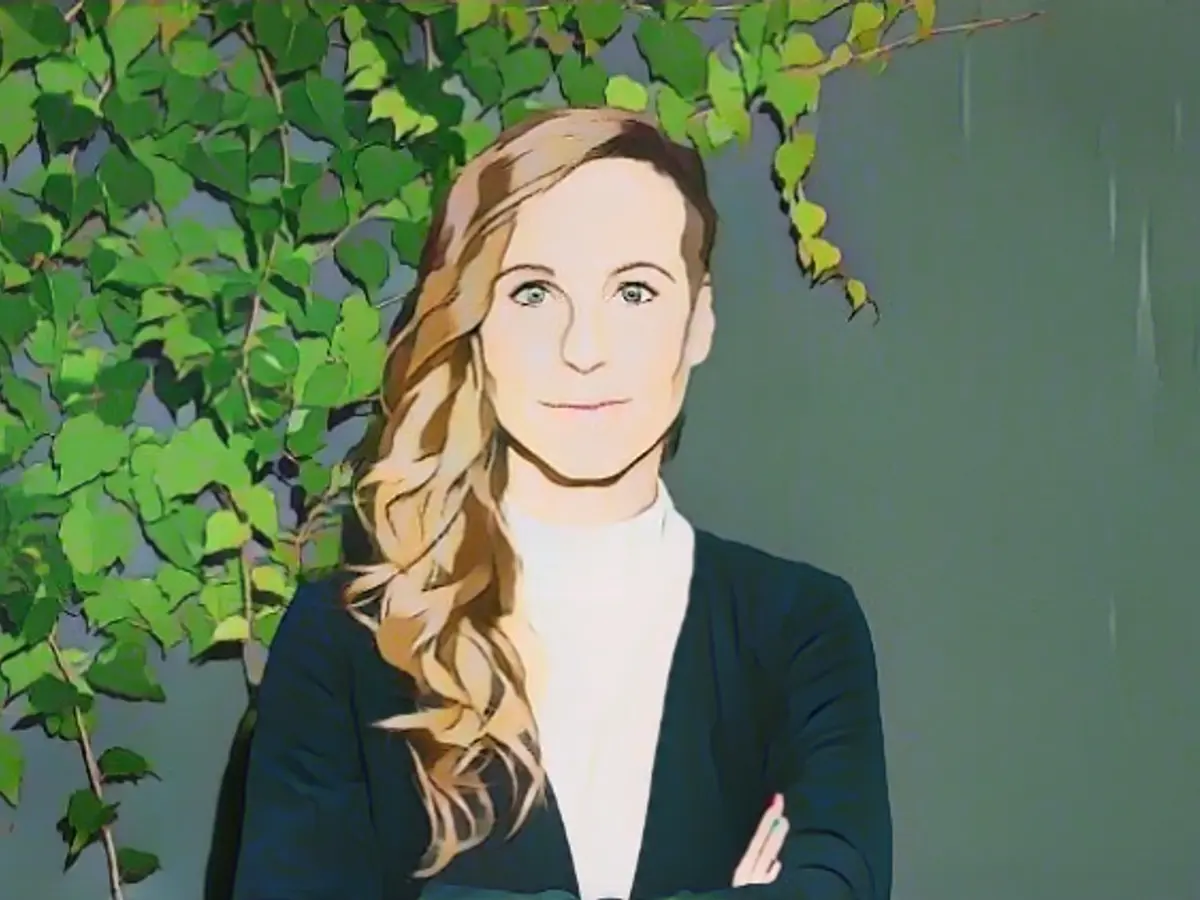"Only very few people want to share their power at work"
Shared leadership instead of a one-man show? Digital board member Fränzi Kühne is convinced of the so-called tandem model. After a year and a half of dual leadership at pen manufacturer Edding, she takes stock. In an interview with ntv.de,the manager and founder explains what her day-to-day work looks like, how the company and her colleagues benefit and why there is no power struggle .
You have opted for job sharing. After a year and a half, you give a positive review on social media. Nevertheless, your time seems to be in short supply. It was very difficult for the two of us to find a time to talk to each other. Hand on heart, does job sharing really work that well?
Honestly and bluntly? Job sharing works great! But it wasn't like that from the start. Of course, I also use the time that I'm not working for Edding AG for my family life and the other jobs that I do on the side. The Christmas period in particular can sometimes be turbulent.
You are a career woman. How did you come up with the idea of sharing your job - we're talking about a management job - with someone else?
When I left the company I had founded, I was in a phase of discovery. I realized early on that no matter what new job I started, it would never be full-time. I have too many projects on the side for that. I've written a book and I give talks on diversity and new work. I wanted to work with a team again, but still do my other jobs and look after my family.
What conditions does a company need to have in place for job sharing, especially shared leadership, to work in the company?
Basically, you need a certain openness to get involved in something like this. Ultimately, however, it doesn't depend so much on the company. In our case, the governance structure had to be clarified and the articles of association amended in order to create the legal framework for both of us to join the Management Board. We have exactly the same contracts. One cannot earn more and the other less. Once the framework conditions had been clarified, it was then up to us - the two tandem members - to agree things. Basically, I don't think you should expect any prefabricated structures, but act yourself and think about a suitable structure for this job model.
You have shared the job of Chief Digital Officer at Edding AG with Boontham Temaismithisince 2022 .Boontham is your "tandem", you say. What is the difference between job sharing and a tandem job?
It's defined differently everywhere. For me, tandem tends to mean a division of time, whereas job sharing means sharing responsibility for content. Boontham and I do both. We share projects, but also management.
And how does that work in practice?
Contractually, we share one position, but we both work 60 percent. Job sharing may sound like 50/50, but you can't manage with less. Our working hours overlap a lot. We are sparring partners, so we have a close exchange of ideas. If I go into a board meeting with a decision, it is automatically smarter than if it had been made by just one person. The quality is simply better because it has gone through two heads.
Does that mean you're always on a short circuit? That sounds awkward. Doesn't that delay decisions?
That's right, we are in constant communication. But if we have to make a decision immediately and have not yet exchanged ideas, we have agreed that the decision will be made by whoever is at that meeting. And the decision is then binding. Whoever says something first has the say. You have to accept that.
Surely you often have to coordinate outside of your working hours. What rules have you established for this?
We work a lot via calendars. I have days when it's very clear to the organization and my tandem partner that I'm not working for Edding and that I'm doing other things. Jour fixe appointments are then split up. We're usually both there for important strategic meetings. But it's also the case that I don't clearly record my time. So I don't work according to a time clock. This also means that I have no idea how many hours a week I'm paid for a 60% position. I do it more or less by gut feeling.
But then you might be working too much and for free?

No, on the other hand I benefit from times when I take longer vacations or when I'm not there for Edding for three days a week. Then I do phone Boontham because I'm interested in what's going on. But I wouldn't see that as working time. There has to be a certain amount of entrepreneurial thinking and responsibility on the part of the players.
That sounds very financially advantageous for a company at first. Surveys have shown that job sharing and such tandem models are perceived as more productive, more agile and more resilient than when one person works full-time alone. Would you agree with that?
The presence and impact of two people taking on responsibility is pretty obvious for a team. If there are two parallel appointments that are important to us, we can attend both. What counts for Edding is that someone is always available and reachable. That's a huge advantage. I think that's why such a model is also perceived as more stable. But as I said, it always requires a certain openness.
You don't see any disadvantages?
Of course there is also skepticism and questions. Who approves the leave and so on. It's important to always have good answers ready and to keep getting feedback. For example, is there room for improvement somewhere? So you always have to have your ear to the ground. Ultimately, it simply has to feel good for all sides.
Do employees sometimes prefer to work with one or the other of you?
That's human nature. In some constellations, the professional exchange takes place via me and the personal exchange via Boontham. But sometimes it's the other way around. With some people, we are also good cop and bad cop. We play it just like the others. That's a huge advantage and it's perceived in the same way. More important than anything else is that we convey a sense of security. None of us has a knowledge advantage or deficit. The team must be able to rely on this. Nothing has to be told twice or an appointment made up because one of us is not in the picture. Job sharing or the tandem model must not result in additional work.
A sharing model is more complex, and not just for employees. For the employer, it means additional costs and extra administrative work. Aren't these valid reasons against the job-sharing model?
When we look at job advertisements and the requirements today, it is often the case that four people are actually being sought for one position. That's why two thinking minds with different skills and competencies in one person are perfect. It's only common sense that this is logical. A company buys two people with different knowledge and different strengths and uses them. The truth is: There is a lot of magic in this completely underestimated model. We need different skills in these times. In addition, a generation is growing up that is no longer prepared to work 40, 60 or 80 hours a week. With the job-sharing model, the employer gets exactly what they need. And at a good price.
In view of the chronic shortage of skilled workers, do you also see the model as an opportunity to attract more women to the job market?
Of course. We are currently doing without 50 percent of the population because leadership and shared leadership don't go down well in people's minds. Many people - regardless of whether they are on the executive floor or in subordinate departments - simply can't imagine it. Status thinking also plays a role here. Very few people want to share their position of leadership and power because that would mean sharing the success when things are going well. For my part, I always say that the successes we celebrate are double the joy and the suffering and failures are shared suffering. I can no longer imagine life without it.
Can everyone tend to manage that?
You have to be sure that your partner at work isn't pursuing their own political agenda and suddenly says, "Actually, I want the position all to myself. I'm actually pursuing other personal goals. This certainty is absolutely essential to avoid a power struggle. Otherwise, this model is doomed to failure. Finding exactly the right person with whom you can do this and whom you trust 100 percent is indeed the biggest challenge.
Do you have the impression that your model is catching on?
Rather less so. At board level, we are the only model in Germany so far. Unfortunately, it has not yet been imitated.
You mentioned the different skills that are an advantage for companies. Can you imagine more employees being able to share a job in a meaningful way? What about three or four people?
I'm thinking about why it wouldn't work. The coordination effort and the search for partners would of course become even more complex. But in principle it works. I also founded a company with three people and it felt like a three-way job share, because you have the same responsibilities with different responsibilities depending on your strengths and skills. So why not?
Diana Dittmer spoke to Fränzi Kühne
Read also:
- Why there is still no EU funding for green Saar steel
- 3 billion Saar Fund is unconstitutional
- Lack of snow also opens up new opportunities for winter tourism
- Abrupt end to e-car subsidies
Despite the challenges, Fränzi Kühne and her tandem partner Boontham Temaismithi have found success in sharing the Chief Digital Officer position at Edding AG. However, Fränzi acknowledges that sharing a management position as a woman can be seen as unconventional, and she encourages more employers to consider this model to attract and retain more women in management positions within the labor market.
In terms of creating a conducive environment for job sharing, Fränzi stresses the importance of a certain openness from the company and clarifying the governance structure and legal frameworks to accommodate dual leadership. She also highlights the need for careful selection of the tandem partner and clear communication to ensure that job sharing does not result in additional work or conflict.
Source: www.ntv.de








